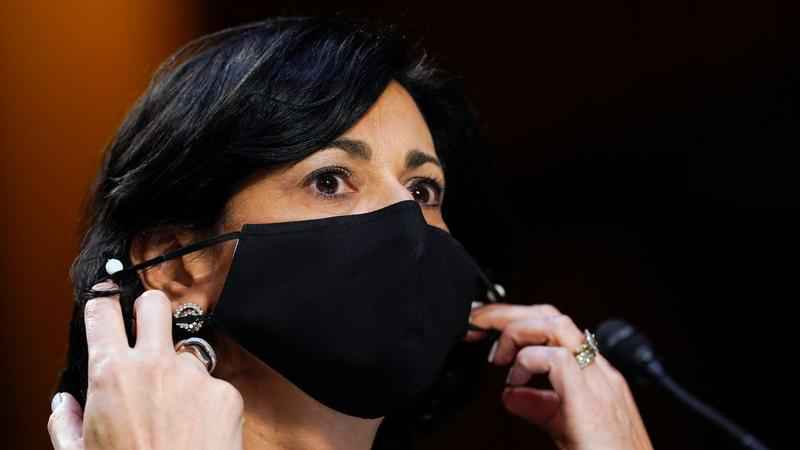Governments, businesses race to reimpose mask mandates

Dr. Rochelle Walensky, director of the Centers for Disease Control and Prevention, adjusts her face mask during a Senate Health, Education, Labor and Pensions Committee hearing on the federal coronavirus response on Capitol Hill in Washington, in this Thursday, March 18, 2021, file photo.[AP Photo/Susan Walsh]
Governments and businesses are scrambling to change course following new federal guidance calling for the return of mask wearing in virus hot spots amid a dramatic spike in COVID-19 cases and hospitalizations nationwide.
Nevada and Kansas City were among the locations that moved swiftly to re-impose indoor mask mandates following Tuesday’s announcement from the Centers for Disease Control and Prevention.
The guidelines also call on all schools to require masks for students, teachers and visitors, and districts around the country are trying to navigate the rules.
In a handful of Republican-led states, lawmakers made it illegal for schools to require masks. South Carolina’s governor said the state would not reverse its mask restriction, but Arkansas leaders are weighing whether to revisit an April law banning local and state government entities from requiring masks.
Republican Gov. Asa Hutchinson has faced growing calls to lift that ban, at least for schools, as virus cases and hospitalizations surge in the state.
Ford Motor Co., meanwhile, said it would reinstate face mask protocols for all employees and visitors at its Missouri and Florida facilities.
Florida and Missouri are among the hardest-hit states during the summer surge in which the U.S. is now averaging more than 60,000 new cases a day, driven by the highly contagious delta variant spreading through unvaccinated populations.
In Springfield, Missouri, a hospital expanded its morgue capacity as the death toll began to soar. Steve Edwards, the CEO of CoxHealth, said at a news conference Tuesday that his company brought in temporary cooling equipment because 75 patients had died this month — 19 just since Friday — at the Springfield hospital and other system hospitals in the region.
CDC Director Rochelle Walensky said Wednesday that her agency’s updated guidance was prompted by new data suggesting vaccinated people can pass on the virus in rare cases.
"I know this is not a message America wants to hear," she told CNN. "With prior variants, when people had these rare breakthrough infections, we didn’t see the capacity of them to spread the virus to others, but with the delta variant, we now see that you can actually now pass it to somebody else."
Walensky stressed that COVID vaccines are working by preventing greater levels of hospitalization and death.
Unvaccinated people, she also noted, account for the vast number of new infections. Two-thirds of the vaccine-eligible population in the U.S. has received at least one dose.
"We can halt the chain of transmission," she told "CBS This Morning" on Wednesday. "We can do something if we unify together, if we get people vaccinated who are not yet vaccinated. If we mask in the interim, we can halt this in just a matter of a couple of weeks."
In Provincetown, Massachusetts, where officials earlier this week re-imposed an indoor mask requirement following a surge in COVID-19 cases this month, store owner Patrick Patrick says he doesn’t mind asking customers to mask up once more.
The owner of Marine Specialties, a long running Army-Navy store, had been leery of officials dropping virus safety mandates ahead of what many expected would be a busy summer season. He even tried to require customers to mask up in his store through the summer, before finally relenting in June.
"If we’d stuck with masks all along, I don’t think we’d be having this conversation," Patrick said, adding that he’s required all his staff to be masked and vaccinated. "They’re not entirely fun, but we wore them all last summer, and we didn’t have a single case in Provincetown. Now see where we’re at."
As of Tuesday, the town had reported more than 750 cases of COVID-19 associated with the most recent cluster, which started around the busy July 4th holiday.
Officials have said many cases are so-called breakthrough infections in vaccinated people. Three people have been hospitalized, but no one has died.